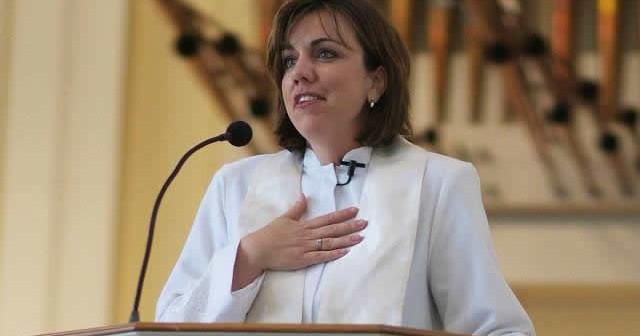The many Christian denominations that ordain women as clergy do so for sound biblical, historical, and theological reasons — even though there are traditions that still prohibit the ordination of women.
Women’s place in God’s work. The biblical story begins with an account of creation that shows a shared domain in which both men and women are commissioned by God to care for the world and others. As the journey continues through the Old Testament, we read of significant ministry from such women as Esther and Deborah. And from the Gospel writers, it is clear that Jesus included women in his apostolic community. While none of these factors relate directly to modern clergy roles, they do reveal the place of women in God’s work.
Women’s leadership in the early church. Then occurs that momentous outpouring of the Spirit in Acts 2. The biblical writer tells us (in 2:17) that here the prophecy of Joel is fulfilled, including the promise that “your daughters shall prophesy.” The Greek word for “prophesy” is broader than the role of the prophet and is used to speak of the general communication of the gospel message. In the congregational era of the New Testament, we see the ministry of women further reinforced by such people as Phillip’s daughters (Acts 21:9), Priscilla (Rom. 16:5), and Junia (Rom. 16:7). Junia is referred to as “prominent among the apostles,” giving credence to the leadership role some women had in the early church. Similarly, Phoebe was described as responsible for carrying and likely reading Paul’s letter to the Roman house churches (Rom. 16:1-2). Paul chose her to serve as his representative to the faith communities in the very heart of the empire.
The Bible clearly reveals the ministry of women in the early church. It is beyond question that by the fourth century, women were ordained to ministry in the church, and this would never have happened if the original proponents had felt they were in violation of the Bible.
Must women keep silent in church? However, there remain two passages, 1 Corinthians 14:34-35 and 1 Timothy 2:8-15, that some use as conclusive arguments against women as ordained clergy.
The Corinthian text addresses women keeping silent in the church meetings. It does not refer to who is leading the service, but only to those who are in the congregation. The silence of women on such occasions is a carryover from the synagogue. It was a sign of reverence not limitation. The culture of the time looked askance at women who spoke in public in ways that could be perceived as disruptive. This passage simply does not address the issue of women in leadership, much less ordination. It refers only to what women should do in the congregation. Nothing is said of what they may (or may not) do as worship leaders. Within these same instructions to the church at Corinth is language in 1 Corinthians 11: 5, where the focus is on head covering. But in this case, women are told their heads must be covered when they are praying and prophesying, that is, leading in worship.
Are women prohibited from teaching or having authority over men? At face value, the 1 Timothy passage appears to prohibit women’s ordination because Paul says, “I permit no woman to teach or to have authority over a man” (2:12). Such is doubtful given Paul’s approving of women ministering publicly in 1 Corinthians 11:5. He commended Euodia and Synteche for their labor in the gospel (Phil. 4:3), and he held Lois and Eunice in highest honor (2 Tim. 1:5). Paul is addressing a specific problem in a young church where some women are seeking to teach or take authority over men independently without first being quiet and learning about their faith. His target is false teaching and abuse of authority, not a universalized ban on the ministry of women.
All are one in Christ Jesus. But the seeds of change had been sown, and sown by Paul himself. Paul was already charting the course for the Christian church, different from Judaism and Greco-Roman culture. He declared the shift in Galatians 3:28: “There is no longer Jew or Greek, there is no longer slave or free, there is no longer male and female; for all of you are one in Christ Jesus.” This principle would revolutionize the church and lay the foundation for the ordination of women. It is against this transformational passage that we ultimately interpret our affirmation of the godly ministry of women.
This article is written by the Rev. Steve Harper, Ph.D., a retired United Methodist elder and author of Five Marks of a Methodist (Abingdon Press, 2015). Used by permission.
A companion Lewis Center resource is “Suggestions for Churches with a Clergywoman.”




